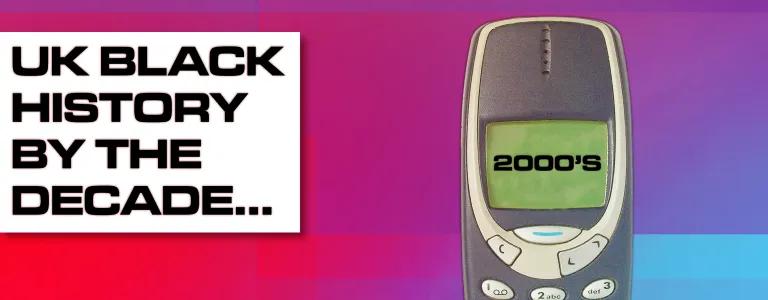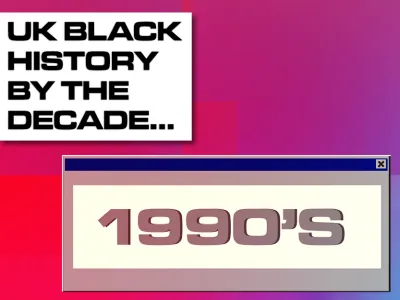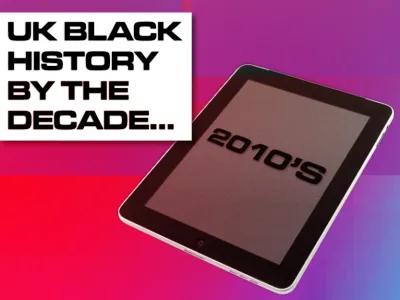
UK Black History By The Decades: 2000s
Include this article in your Skills Builder Journal. It could help you develop... 

Black history is British history. Fact. And we’re back with the third installment of our By The Decade series, looking at UK Black history. This time, we’re in the 2000s.
Unfortunately, the 2000s started with more heartache and injustice for the Black community. On his walk home from a library, ten-year-old Damilola Taylor was stabbed and left to die by Danny and Ricky Preddie, brothers, who were 12 and 13, and part of the Young Peckham Boys gang. It took several years and multiple trials for the Preddie brothers to be convicted - as trials were acquitted for unreliable witnesses. Damilola’s death raised many questions about what leads young people to commit acts of violence, and became one of the UK’s most high-profile cases.
One year later, Damilola’s dad, Richard Taylor OBE, set up the Damilola Taylor Trust as a memorial to his son and a way to bring change to the community. The trust believes every young person should have the opportunity to live their lives free of fear and violence, to dream big and face the future with confidence and optimism. They aim to provide a positive legacy of hope and opportunity for disadvantaged and underprivileged young people. On the twentieth anniversary of Damilola’s death, in 2020, Richard also formed The Hope Collective campaign, which aims to shine a light on the positive contributions of young people, and is dedicated to their stories of ambition and hope.
In 2002, Paul Boateng made history. He was appointed Chief Secretary to the Treasure and became the first Black cabinet minister. On getting this position he said: "First and foremost I am a cabinet minister. My colour is part of me but I do not choose to be defined by my colour. I work for a world in which people are not judged by their colour but by the content of their character. I want to be judged by my work in this position."
Like the decades before it, the 2000s were full of musical achievements and celebration. 2002 saw the formation of one of the most influential grime collectives of all time - Roll Deep - which included the likes of Jammer, Dizzee Rascal, Wiley, Skepta and Target. In the same year, Ms. Dynamite won the Mercury Music Prize for her album A Little Deeper, and the following year, in 2003, it was won by Dizzee Rascal for his album Boy in Da Corner.
History was made again in 2004, when Jason Robinson, who was nicknamed Billy Whizz because of his speed on the pitch, became the first Black captain of the England rugby union team. Looking back on this, in a recent interview Jason said, “I didn’t realise at the time how important being England’s men’s first black captain was to other people looking in. We relate to people who are like us in some way, so it matters.”
The following year, 2005, saw Dr John Sentamu become the first Black Archbishop of York. His enthroning was watched by more than 3,000 people and was a truly joyful celebration, combining his Ugandan heritage with traditional Church of England protocol. Dr John wore a brightly coloured cope and mitre, and was followed by a group of African drummers and dancers, who wore feathered headdresses and performed the Bwola dance - a royal dance of the Acholi people of Uganda.
2005 also saw links back to the case of Stephen Lawrence - a young boy who was killed in a racist attack in 1993. In 2005, the law was changed, and the rule against double jeopardy - the common law rule that once acquitted, an accused person could not be tried a second time for the same crime - was repealed in murder cases, and that if there was ‘fresh and viable’ new evidence, a second trial would be able to proceed. Therefore, 17 years after it first happened, Stephen Lawrence’s case was reopened, and a trial proceeded in 2006, as new evidence was found. A microscopic stain of Stephen Lawrence’s blood was found in Gary Dobson’s jacket (one of the first suspects, who was arrested but subsequently acquitted). This new evidence was only found because of scientific developments and developments in forensic approaches that had taken place since 1996 which allowed microscopic blood stains and hair fragments to be analysed for DNA and other microscopic evidence to be found and used forensically. It would be another few years before Gary Dobson was arrested however (which we’ll get to in our next blog, covering the 2010s, so keep an eye out).
In 2007, the Ajegbo report - or the Diversity and Citizenship curriculum review - was published. The report looked at what was being taught in schools when it came to what ‘Britishness’ meant, and the lack of diversity being taught. It saw that “despite much good practice in trailblazing schools, the quality and quantity of education for diversity are uneven across England”. That some teachers lacked confidence in engaging with diversity issues at that time due to a lack of resources and training. Pupils’ voices were not given enough consideration in this area, and there was insufficient clarity about the flexibility within the curriculum and how links to education for diversity could be made, amongst other things. The report had an aim to get all schools to nurture their students and participate in an active and inclusive democracy, appreciating and understanding differences, and started important conversations about how the curriculum is taught.
Inclusion was also a big part of British-American John Amaechi’s life, and decision in 2007 to become the first NBA player to speak publicly about being gay. In his memoir, writing about the decision to go public, he said “you stop being the person who scored this many goals, ran this fast - you’re just the gay guy and that’s disappointing.” But he knew there was more to it than that. And when he attended Pride in Manchester, he noticed a teenage boy watching from the cathedral gardens, hiding behind some tombstones. The boy watched as Ian McKellen drove by on the back of a pink Cadillac and “kind of emerged from his shell, just for a minute”, said John. It was then that the decision was made for him. And he wrote, “Maybe I could do that for people who don’t look like Ian McKellen. People need to know that black people can be gay. And that one does not make the other lesser.”
Towards the end of the decade, Stephen Lawrence, was honoured with the opening of the Stephen Lawrence Centre opened in Deptford in 2007. The centre aimed to support everyone in Lewisham who needed it, particularly focusing on improving the life chances of Black Caribbean and African young people. The centre, with meeting rooms, classrooms, IT labs, offices and exhibition spaces, worked closely with partners in the area to help young people enjoy education and overcome barriers to fulfilment.

In 2008, Barack Obama became the first Black president of the United States. In the run up to his election, he visited the UK, which led to many people asking the question ‘will there ever be a Black Prime Minister?’. Thirteen years later and we’re still asking...but hey, you never know, one of you reading this might just be it!
We’re aware that we may have missed a few things and that of course, UK Black history didn’t start in the 2000s. So feel free to let us know anything you’ve learnt and think is important to share over at @NCS!




